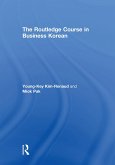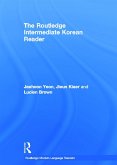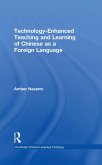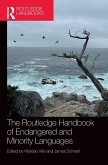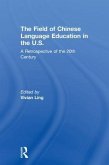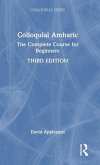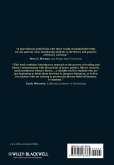The Routledge Handbook of the Sociopolitical Context of Language Learning
Herausgeber: Chao, Der-Lin; Wei, Weixiao
The Routledge Handbook of the Sociopolitical Context of Language Learning
Herausgeber: Chao, Der-Lin; Wei, Weixiao
- Gebundenes Buch
- Merkliste
- Auf die Merkliste
- Bewerten Bewerten
- Teilen
- Produkt teilen
- Produkterinnerung
- Produkterinnerung
The Routledge Handbook of the Sociopolitical Context of Language Learning is a compelling examination of how language education must adapt to our rapidly changing world. This book explores the need for a fresh perspective on language learning, moving beyond traditional methods to address the complexities of today's global landscape.
Andere Kunden interessierten sich auch für
![The Routledge Course in Business Korean The Routledge Course in Business Korean]() Young-Key Kim-RenaudThe Routledge Course in Business Korean197,99 €
Young-Key Kim-RenaudThe Routledge Course in Business Korean197,99 €![The Routledge Intermediate Korean Reader The Routledge Intermediate Korean Reader]() Jaehoon YeonThe Routledge Intermediate Korean Reader187,99 €
Jaehoon YeonThe Routledge Intermediate Korean Reader187,99 €![Technology-Enhanced Teaching and Learning of Chinese as a Foreign Language Technology-Enhanced Teaching and Learning of Chinese as a Foreign Language]() Amber NavarreTechnology-Enhanced Teaching and Learning of Chinese as a Foreign Language197,99 €
Amber NavarreTechnology-Enhanced Teaching and Learning of Chinese as a Foreign Language197,99 €![The Routledge Handbook of Endangered and Minority Languages The Routledge Handbook of Endangered and Minority Languages]() The Routledge Handbook of Endangered and Minority Languages299,99 €
The Routledge Handbook of Endangered and Minority Languages299,99 €![The Field of Chinese Language Education in the U.S. The Field of Chinese Language Education in the U.S.]() The Field of Chinese Language Education in the U.S.198,99 €
The Field of Chinese Language Education in the U.S.198,99 €![Colloquial Amharic Colloquial Amharic]() David AppleyardColloquial Amharic200,99 €
David AppleyardColloquial Amharic200,99 €![The English Handbook The English Handbook]() William WhitlaThe English Handbook114,99 €
William WhitlaThe English Handbook114,99 €-
-
-
The Routledge Handbook of the Sociopolitical Context of Language Learning is a compelling examination of how language education must adapt to our rapidly changing world. This book explores the need for a fresh perspective on language learning, moving beyond traditional methods to address the complexities of today's global landscape.
Hinweis: Dieser Artikel kann nur an eine deutsche Lieferadresse ausgeliefert werden.
Hinweis: Dieser Artikel kann nur an eine deutsche Lieferadresse ausgeliefert werden.
Produktdetails
- Produktdetails
- Verlag: Taylor & Francis Ltd
- Seitenzahl: 548
- Erscheinungstermin: 11. März 2025
- Englisch
- Abmessung: 246mm x 174mm
- Gewicht: 1220g
- ISBN-13: 9781032503615
- ISBN-10: 1032503610
- Artikelnr.: 71709286
- Herstellerkennzeichnung
- Libri GmbH
- Europaallee 1
- 36244 Bad Hersfeld
- gpsr@libri.de
- Verlag: Taylor & Francis Ltd
- Seitenzahl: 548
- Erscheinungstermin: 11. März 2025
- Englisch
- Abmessung: 246mm x 174mm
- Gewicht: 1220g
- ISBN-13: 9781032503615
- ISBN-10: 1032503610
- Artikelnr.: 71709286
- Herstellerkennzeichnung
- Libri GmbH
- Europaallee 1
- 36244 Bad Hersfeld
- gpsr@libri.de
Weixiao Wei is the author of three monographs: An Overview of Chinese Translation Studies at the Beginning of the 21st Century (2019), The History of Chinese Rhetoric (2022), and A Notional Analysis of Chinese Academic Discourse on China (2023). She has also served as editor or co-editor for three Routledge volumes: The Routledge Handbook of Chinese Studies (2021), China's Contemporary Image and Rhetoric Practice (2022) and The Routledge Handbook of Descriptive Rhetorical Studies and World Language (2023). Her recent projects include two forthcoming handbooks, set for publication in 2025: The Routledge Handbook of Endangered and Minority Languages and The Routledge Handbook of the Sociopolitical Context of Language Learning. Weixiao's research and teaching focus on English rhetoric and composition, and she is currently pursuing a PhD at the University of Houston. Der-lin Chao is Professor and Head of the Chinese BA in Language, Literature, and Translation and leads the MA in the Teaching of Chinese at Hunter College, City University of New York. She devotes herself to language program pedagogy, design, and evaluation; development of technology and web-based instructional materials; teacher education; proficiency-based language education; and the history of Chinese language instruction. In addition, she is thoroughly invested in developing extra-collegiate Chinese educational initiatives, including K-12 Chinese curriculum development and enhancement with partner schools throughout the New York City area.
Introduction
Section I: The New Sociopolitical Contexts of Language Learning
1. Present and Future of the Ukrainian Language Teaching and Ukrainian
Studies in Europe
2. Revisiting the Influence of Linguistic Hegemony in Oman: The Choice of
English as a Medium of Instruction
3. Does Thailand's English Language Education Reflect Thainess? The Case of
a Thai Ideology in English Language Learning
4. Language Education Ideologies in Pakistani Education Policies and
Newspapers: Ecology of Languages or Diffusion of English Paradigm?
5. The CEFR and English Language Curriculum Reform in Vietnamese Higher
Education: Tensions in Teacher Agency
6. Exploring Intercultural Dynamics in CFL: Experiences of International
Students in Chinese Higher Education
7. The Globalization of the Korean Language in the Context of South
Korea-China Relations
Section II: Language Learning and Teaching as Advocacy and Social Justice
8. New Dogma for a Dogma-Averse Age: A Fantasy-Theme Analysis of Pedagogy
of the Oppressed
9. Teacher Candidates' Perspectives on Addressing Social Justice in English
Language and Literature Classes through Critical Pedagogy
10. Bilingual Education Research in the U.S.: A Critical Analysis of School
Choice and Neoliberal Ideologies in Dual Language Programs
11. Implementing Sustainable Education Through Project-based Learning: A
Case Study of L2 Instruction in Tunisia
12. Negotiating Multilingual Language Education Through a Democratic
All-stakeholder Discussion in Cambodian Universities: The Teaching of
Less-Learned Languages Other Than English
13. Learning the Language of Gender and Feminism in Postcommunist Countries
of Central and Eastern Europe
14. Foreign Language Learning in a Welfare Linguistics Framework: The Case
of Japanese
Section III: Ideology, Identity, and Language Politics
15. Creating an Enemy as a Feature of Ideological Discourse: The Case of
Contemporary Russian Power in Relation to Ukraine
16. Language Ideologies and Politics of Language in Education in Southeast
Asia
17. Ideology, Language, and Education: The Linguistic Mechanism of Ideology
and Its Transformation
18. Learning from Totalitarianism: The Inculcation of Ideology through
Language
19. International Students and Neoliberal English-Medium Higher Education:
Contextualizing the Impact of Race and Language Ideologies
20. Western Language Ideology and Saudi English Identity
21. The Seesaw of Using Cantonese or Putonghua as the Medium of Instruction
for Teaching the Chinese Language Subject in Post-colonial Hong Kong
Context: A Storm in a Teacup?
22. Linguistic Characteristics and Strategies of Charismatic Speakers: A
Critical Discourse Analysis of Han Kuo-yu's Political Speeches
23. Limits of Anthropocentrism: Representation of Environmental Ecology in
English Textbooks in Pakistan
Section IV: Innovative Approaches in Language Learning and Teaching in the
New Global Context
24. Towards Equitable, Diverse and Inclusive Language Models in AI-enhanced
Education Technology for Language Learners
25. Developing Critical Awareness and Regaining Personal Agency: Autonomous
Language Learning as a Personal Liberating Process
26. Learning Portuguese in the Context of Climate Change and The Amazon
27. Adaptive Learning Methods in Speech-Language Pathology: A Case Study
Exploration of Transformative Practices in the Post-Covid Era
28. Technology-enhanced Scenario-based Reading Assessment of Pre-service
English Teachers
29. Linguistic Landscapes as a Pedagogical Tool to Promote Global
Citizenship Skills: Envisioning the Role of Service Learning
30. Assessment of Academic Writing for Undergraduate Nursing Students
During COVID-19
31. Going Beyond War Metaphors: An Educational Intervention About Framing
Global Issues
Section I: The New Sociopolitical Contexts of Language Learning
1. Present and Future of the Ukrainian Language Teaching and Ukrainian
Studies in Europe
2. Revisiting the Influence of Linguistic Hegemony in Oman: The Choice of
English as a Medium of Instruction
3. Does Thailand's English Language Education Reflect Thainess? The Case of
a Thai Ideology in English Language Learning
4. Language Education Ideologies in Pakistani Education Policies and
Newspapers: Ecology of Languages or Diffusion of English Paradigm?
5. The CEFR and English Language Curriculum Reform in Vietnamese Higher
Education: Tensions in Teacher Agency
6. Exploring Intercultural Dynamics in CFL: Experiences of International
Students in Chinese Higher Education
7. The Globalization of the Korean Language in the Context of South
Korea-China Relations
Section II: Language Learning and Teaching as Advocacy and Social Justice
8. New Dogma for a Dogma-Averse Age: A Fantasy-Theme Analysis of Pedagogy
of the Oppressed
9. Teacher Candidates' Perspectives on Addressing Social Justice in English
Language and Literature Classes through Critical Pedagogy
10. Bilingual Education Research in the U.S.: A Critical Analysis of School
Choice and Neoliberal Ideologies in Dual Language Programs
11. Implementing Sustainable Education Through Project-based Learning: A
Case Study of L2 Instruction in Tunisia
12. Negotiating Multilingual Language Education Through a Democratic
All-stakeholder Discussion in Cambodian Universities: The Teaching of
Less-Learned Languages Other Than English
13. Learning the Language of Gender and Feminism in Postcommunist Countries
of Central and Eastern Europe
14. Foreign Language Learning in a Welfare Linguistics Framework: The Case
of Japanese
Section III: Ideology, Identity, and Language Politics
15. Creating an Enemy as a Feature of Ideological Discourse: The Case of
Contemporary Russian Power in Relation to Ukraine
16. Language Ideologies and Politics of Language in Education in Southeast
Asia
17. Ideology, Language, and Education: The Linguistic Mechanism of Ideology
and Its Transformation
18. Learning from Totalitarianism: The Inculcation of Ideology through
Language
19. International Students and Neoliberal English-Medium Higher Education:
Contextualizing the Impact of Race and Language Ideologies
20. Western Language Ideology and Saudi English Identity
21. The Seesaw of Using Cantonese or Putonghua as the Medium of Instruction
for Teaching the Chinese Language Subject in Post-colonial Hong Kong
Context: A Storm in a Teacup?
22. Linguistic Characteristics and Strategies of Charismatic Speakers: A
Critical Discourse Analysis of Han Kuo-yu's Political Speeches
23. Limits of Anthropocentrism: Representation of Environmental Ecology in
English Textbooks in Pakistan
Section IV: Innovative Approaches in Language Learning and Teaching in the
New Global Context
24. Towards Equitable, Diverse and Inclusive Language Models in AI-enhanced
Education Technology for Language Learners
25. Developing Critical Awareness and Regaining Personal Agency: Autonomous
Language Learning as a Personal Liberating Process
26. Learning Portuguese in the Context of Climate Change and The Amazon
27. Adaptive Learning Methods in Speech-Language Pathology: A Case Study
Exploration of Transformative Practices in the Post-Covid Era
28. Technology-enhanced Scenario-based Reading Assessment of Pre-service
English Teachers
29. Linguistic Landscapes as a Pedagogical Tool to Promote Global
Citizenship Skills: Envisioning the Role of Service Learning
30. Assessment of Academic Writing for Undergraduate Nursing Students
During COVID-19
31. Going Beyond War Metaphors: An Educational Intervention About Framing
Global Issues
Introduction
Section I: The New Sociopolitical Contexts of Language Learning
1. Present and Future of the Ukrainian Language Teaching and Ukrainian
Studies in Europe
2. Revisiting the Influence of Linguistic Hegemony in Oman: The Choice of
English as a Medium of Instruction
3. Does Thailand's English Language Education Reflect Thainess? The Case of
a Thai Ideology in English Language Learning
4. Language Education Ideologies in Pakistani Education Policies and
Newspapers: Ecology of Languages or Diffusion of English Paradigm?
5. The CEFR and English Language Curriculum Reform in Vietnamese Higher
Education: Tensions in Teacher Agency
6. Exploring Intercultural Dynamics in CFL: Experiences of International
Students in Chinese Higher Education
7. The Globalization of the Korean Language in the Context of South
Korea-China Relations
Section II: Language Learning and Teaching as Advocacy and Social Justice
8. New Dogma for a Dogma-Averse Age: A Fantasy-Theme Analysis of Pedagogy
of the Oppressed
9. Teacher Candidates' Perspectives on Addressing Social Justice in English
Language and Literature Classes through Critical Pedagogy
10. Bilingual Education Research in the U.S.: A Critical Analysis of School
Choice and Neoliberal Ideologies in Dual Language Programs
11. Implementing Sustainable Education Through Project-based Learning: A
Case Study of L2 Instruction in Tunisia
12. Negotiating Multilingual Language Education Through a Democratic
All-stakeholder Discussion in Cambodian Universities: The Teaching of
Less-Learned Languages Other Than English
13. Learning the Language of Gender and Feminism in Postcommunist Countries
of Central and Eastern Europe
14. Foreign Language Learning in a Welfare Linguistics Framework: The Case
of Japanese
Section III: Ideology, Identity, and Language Politics
15. Creating an Enemy as a Feature of Ideological Discourse: The Case of
Contemporary Russian Power in Relation to Ukraine
16. Language Ideologies and Politics of Language in Education in Southeast
Asia
17. Ideology, Language, and Education: The Linguistic Mechanism of Ideology
and Its Transformation
18. Learning from Totalitarianism: The Inculcation of Ideology through
Language
19. International Students and Neoliberal English-Medium Higher Education:
Contextualizing the Impact of Race and Language Ideologies
20. Western Language Ideology and Saudi English Identity
21. The Seesaw of Using Cantonese or Putonghua as the Medium of Instruction
for Teaching the Chinese Language Subject in Post-colonial Hong Kong
Context: A Storm in a Teacup?
22. Linguistic Characteristics and Strategies of Charismatic Speakers: A
Critical Discourse Analysis of Han Kuo-yu's Political Speeches
23. Limits of Anthropocentrism: Representation of Environmental Ecology in
English Textbooks in Pakistan
Section IV: Innovative Approaches in Language Learning and Teaching in the
New Global Context
24. Towards Equitable, Diverse and Inclusive Language Models in AI-enhanced
Education Technology for Language Learners
25. Developing Critical Awareness and Regaining Personal Agency: Autonomous
Language Learning as a Personal Liberating Process
26. Learning Portuguese in the Context of Climate Change and The Amazon
27. Adaptive Learning Methods in Speech-Language Pathology: A Case Study
Exploration of Transformative Practices in the Post-Covid Era
28. Technology-enhanced Scenario-based Reading Assessment of Pre-service
English Teachers
29. Linguistic Landscapes as a Pedagogical Tool to Promote Global
Citizenship Skills: Envisioning the Role of Service Learning
30. Assessment of Academic Writing for Undergraduate Nursing Students
During COVID-19
31. Going Beyond War Metaphors: An Educational Intervention About Framing
Global Issues
Section I: The New Sociopolitical Contexts of Language Learning
1. Present and Future of the Ukrainian Language Teaching and Ukrainian
Studies in Europe
2. Revisiting the Influence of Linguistic Hegemony in Oman: The Choice of
English as a Medium of Instruction
3. Does Thailand's English Language Education Reflect Thainess? The Case of
a Thai Ideology in English Language Learning
4. Language Education Ideologies in Pakistani Education Policies and
Newspapers: Ecology of Languages or Diffusion of English Paradigm?
5. The CEFR and English Language Curriculum Reform in Vietnamese Higher
Education: Tensions in Teacher Agency
6. Exploring Intercultural Dynamics in CFL: Experiences of International
Students in Chinese Higher Education
7. The Globalization of the Korean Language in the Context of South
Korea-China Relations
Section II: Language Learning and Teaching as Advocacy and Social Justice
8. New Dogma for a Dogma-Averse Age: A Fantasy-Theme Analysis of Pedagogy
of the Oppressed
9. Teacher Candidates' Perspectives on Addressing Social Justice in English
Language and Literature Classes through Critical Pedagogy
10. Bilingual Education Research in the U.S.: A Critical Analysis of School
Choice and Neoliberal Ideologies in Dual Language Programs
11. Implementing Sustainable Education Through Project-based Learning: A
Case Study of L2 Instruction in Tunisia
12. Negotiating Multilingual Language Education Through a Democratic
All-stakeholder Discussion in Cambodian Universities: The Teaching of
Less-Learned Languages Other Than English
13. Learning the Language of Gender and Feminism in Postcommunist Countries
of Central and Eastern Europe
14. Foreign Language Learning in a Welfare Linguistics Framework: The Case
of Japanese
Section III: Ideology, Identity, and Language Politics
15. Creating an Enemy as a Feature of Ideological Discourse: The Case of
Contemporary Russian Power in Relation to Ukraine
16. Language Ideologies and Politics of Language in Education in Southeast
Asia
17. Ideology, Language, and Education: The Linguistic Mechanism of Ideology
and Its Transformation
18. Learning from Totalitarianism: The Inculcation of Ideology through
Language
19. International Students and Neoliberal English-Medium Higher Education:
Contextualizing the Impact of Race and Language Ideologies
20. Western Language Ideology and Saudi English Identity
21. The Seesaw of Using Cantonese or Putonghua as the Medium of Instruction
for Teaching the Chinese Language Subject in Post-colonial Hong Kong
Context: A Storm in a Teacup?
22. Linguistic Characteristics and Strategies of Charismatic Speakers: A
Critical Discourse Analysis of Han Kuo-yu's Political Speeches
23. Limits of Anthropocentrism: Representation of Environmental Ecology in
English Textbooks in Pakistan
Section IV: Innovative Approaches in Language Learning and Teaching in the
New Global Context
24. Towards Equitable, Diverse and Inclusive Language Models in AI-enhanced
Education Technology for Language Learners
25. Developing Critical Awareness and Regaining Personal Agency: Autonomous
Language Learning as a Personal Liberating Process
26. Learning Portuguese in the Context of Climate Change and The Amazon
27. Adaptive Learning Methods in Speech-Language Pathology: A Case Study
Exploration of Transformative Practices in the Post-Covid Era
28. Technology-enhanced Scenario-based Reading Assessment of Pre-service
English Teachers
29. Linguistic Landscapes as a Pedagogical Tool to Promote Global
Citizenship Skills: Envisioning the Role of Service Learning
30. Assessment of Academic Writing for Undergraduate Nursing Students
During COVID-19
31. Going Beyond War Metaphors: An Educational Intervention About Framing
Global Issues


